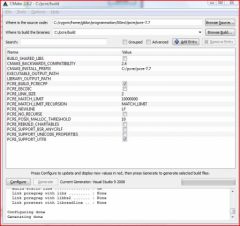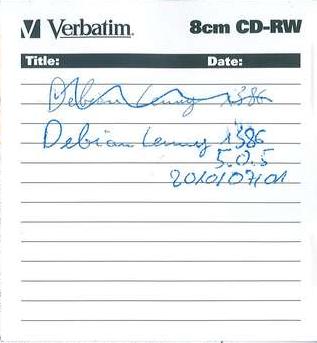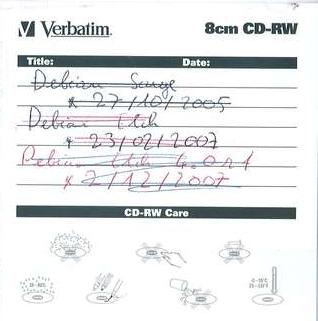
In my effort to automate most of the stuff needed to release, I am working on a SOAP to OCaml converter. Richard W.M. Jones has kindly allowed me to take-over its project "ocsoap". The project is now located
here and I am working on making it compatible with
FusionForge SOAP.
My first step was to make it compatible with
OASIS and ocamlbuild. The project is Makefile based and needs some extra care to make it ocamlbuild based.
The oasis-fication itself was a piece of cake. Just describe the dependencies of the project and make some extra choice like compiling the camlp5 extension to a
.cma rather than a
.cmo. You can see the
_oasis and
myocamlbuild.ml results, compared to the initial
Makefile.
The
_oasis is simple:
OASISFormat: 0.3
Name: ocsoap
Version: 0.7.1
Synopsis: SOAP converter to OCaml code
Authors: Richard W.M. Jones, Sylvain Le Gall
License: LGPL-2.1 with OCaml linking exception
Plugins: DevFiles (0.3), META (0.3),
StdFiles (0.3)
BuildTools: ocamlbuild,
cduce
BuildDepends: dynlink,
pxp-lex-utf8,
pxp-engine,
netclient,
cduce,
extlib,
calendar,
pcre
Library ocsoap
Path: src
Modules: OCSoap
Library pa_ocsoapclientstubs
Path: src
Modules: Pa_ocsoapclientstubs
BuildTools: camlp5o
BuildDepends: camlp5
FindlibParent: ocsoap
FindlibName: syntax
CompiledObject: byte
Executable wsdl_validate
Path: src
MainIs: wsdl_validate.ml
Executable wsdltointf
Path: src
MainIs: wsdltointf.ml
Executable adwords_test1
Path: examples/adwords
BuildDepends: ocsoap
MainIs: test1.ml
Build$: flag(tests)
Install: false
BuildTools: camlp5o
BuildDepends: ocsoap.syntax
Executable adwords_test2
Path: examples/adwords
BuildDepends: ocsoap
MainIs: test2.ml
Build$: flag(tests)
Install: false
BuildTools: camlp5o
BuildDepends: ocsoap.syntax
Executable adwords_examples
Path: examples/adwords
BuildDepends: ocsoap
MainIs: example.ml
Build$: flag(tests)
Install: false
BuildTools: camlp5o
BuildDepends: ocsoap.syntax
Document "api-ocsoap"
Title: API reference of OCSoap
Type: ocamlbuild (0.3)
BuildTools+: ocamldoc
XOCamlbuildLibraries: ocsoap
XOCamlbuildPath: src/
Most of it was generated using
oasis quickstart, that helps you to write
_oasis. This part was not tricky and mostly a translation of what the previous
Makefile was explaining, in its language.
Now comes the tricky part, translating Makefile rules into ocamlbuild rules. This part is more tricky because the general principle behind Makefile and ocamlbuild are not exactly the same.
Let's start with a simple rule: compiling a
CDuce .cd file into a
.cdo.
Here is the Makefile rule:
%.cdo: %.cd
$(CDUCE) --compile $<
In the oasis-fication, we have added an extra complexity, because we move the source to
src, which needs extra flags.
Here is the ocamlbuild rule:
rule "cduce: %.cd -> %.cdo"
~prod:"%.cdo"
~dep:"%.cd"
begin
fun env build ->
Cmd(S[cduce;
T(tags_of_pathname (env "%.cd")++"cduce"++"compile");
A"--compile";
A"-I"; P(Filename.dirname (env "%.cd"));
P (env "%.cd")])
end
;;
It is a little bit more complex, lets explain it.
The function
rule create a rule with a name and a function that execute it. The labels
~prod and
~dep are the right and left parts of
%.cdo: %.cd of the Makefile. When we call
env "%cd", it replaces the
% by the matching part of
~prod and
~dep.
Next we return a Rule.action. The rule in this case is a command
Cmd. This rules use a sequence
S, which are the command line itself. The sequence is made of smaller pieces that can be a placeholder for tag content (
T + what will trigger it), atom (
A, typically command line option), and filename (
P).
For a file
src/foo.ml, the command generated will
cduce $(TAG) --compile -I src src/foo.ml
where
$(TAG) will be replaced by the content of
flag ["file:src/foo.ml"; "cduce"; "compile"] content. But also by the content of
flag ["cduce"; "compile"] content, the flag just need to be subset. For example if you want to add
--verbose to the command line, just add
flag ["cduce"; "compile"] (S[A"--verbose"]);; somewhere in
myocamlbuild.ml.
Next rules, we need to compile
%.cdo to
%.cmo. It is trickier because in this case, we want to have
%.cmi eventually built before. It is not require to build it before, if there is no
%.mli file.
Here is the code to do that:
let cduce_mkstubs includes =
Quote (S([cduce;
S(List.map
(fun fn -> S[A"-I"; P fn])
includes);
A"--mlstub"]));;
(* cduce < 0.3.9: cdo2ml -static *)
let cduce_compile_args env =
[
A"-c"; A"-package"; A"cduce";
A"-pp"; cduce_mkstubs [Filename.dirname (env "%.cmi")];
A"-I"; P(Filename.dirname (env "%.cmi"));
A"-impl"; P(env "%.cdo")
]
;;
let cduce_prepare_compile env build =
List.iter
(function
Outcome.Bad _ ->
(* Fail but it just means that the .cmi will be generated
* during compilation.
*)
()
Outcome.Good _ ->
())
(build [[env "%.cmi"]])
;;
rule "cduce: %.cdo -> %.cmo"
~prod:"%.cmo"
~dep:"%.cdo"
begin
fun env build ->
cduce_prepare_compile env build;
Cmd(S(
[ocamlfind; ocamlc;
T(tags_of_pathname (env "%.cdo")
++"cduce"++"ocamlc"++"compile"++"byte")]
@ (cduce_compile_args env)))
end
;;
The difference with the former rules, is that we call
cduce_prepare_compile which in turns call
(build [[env "%.cmi"]]). The call to
build will ask ocamlbuild to compile
src/foo.cmi, but we don't care about the result, i.e. in case of
Outcome.Bad exn we don't fail. This way we don't stop the build process that will continue and produce a
.cmo and
.cmi just out of the
.cdo. The
.cdo itself is compiled as a
.ml file with
ocamlfind ocamlc except that we apply
cduce --mlstub as a preprocessor
A"-pp"; Quote(S[cduce; ..; A"--mlstub"]).
The last rule that I will comment is the one that transform a
.intf into a
.ml. This rule is particular because it is totally different than the pieces of code of the original Makefile.
Here are the couple of rules that was needed to translate
.intf:
examples/adwords/%Service.cmx: examples/adwords/%Service.intf
ocamlfind ocamlopt $(OCAMLOPTFLAGS) -c \
-pp "camlp5o ./pa_ocsoapclientstubs.cmo -impl" -c -impl $<
.depend: $(wildcard *.mli) $(wildcard *.ml) \
$(wildcard examples/adwords/*.mli) $(wildcard examples/adwords/*.ml)
$(OCAMLDEP) $^ > .depend
for f in examples/adwords/*.intf; do \
$(OCAMLDEP) \
-pp "camlp5o ./pa_ocsoapclientstubs.cmo pr_o.cmo -impl" $$f \
>> .depend; \
done
Here is the ocamlbuild rule:
rule "ocsoap: %.intf -> %.ml"
~prod:"%.ml"
~deps:(if !ocsoap_dev then
["%.intf"; !pa_ocsoapclientstubs]
else
["%.intf"])
begin
fun env build ->
Cmd(S[Px !camlp5o; P !pa_ocsoapclientstubs; P "pr_o.cmo"; A"-impl";
P(env "%.intf"); A"-o"; P(env "%.ml")])
end
;;
Here we decided to translate directly the
.intf into a
.ml file. The good thing about ocamlbuild is that it has a powerfull dynamicy dependencies scheme. So here you will generate the
.ml file, which in turns will generate a
.ml.depends and then will be compiled the standard way. In the makefile, you need to compute the
.depends file using a different process that will do everything before the compilation even starts (in fact, before the inclusion of the
.depends). We also use the trick to use an OCaml printer (
pr_o.cmo) with camlp5o, that will directly output the standard
.ml file.
Don't hesitate to post comment if you have question about OASIS and ocamlbuild
Enjoy.
 In my effort to automate most of the stuff needed to release, I am working on a SOAP to OCaml converter. Richard W.M. Jones has kindly allowed me to take-over its project "ocsoap". The project is now located here and I am working on making it compatible with FusionForge SOAP.
My first step was to make it compatible with OASIS and ocamlbuild. The project is Makefile based and needs some extra care to make it ocamlbuild based.
The oasis-fication itself was a piece of cake. Just describe the dependencies of the project and make some extra choice like compiling the camlp5 extension to a .cma rather than a .cmo. You can see the
_oasis and myocamlbuild.ml results, compared to the initial Makefile.
The _oasis is simple:
In my effort to automate most of the stuff needed to release, I am working on a SOAP to OCaml converter. Richard W.M. Jones has kindly allowed me to take-over its project "ocsoap". The project is now located here and I am working on making it compatible with FusionForge SOAP.
My first step was to make it compatible with OASIS and ocamlbuild. The project is Makefile based and needs some extra care to make it ocamlbuild based.
The oasis-fication itself was a piece of cake. Just describe the dependencies of the project and make some extra choice like compiling the camlp5 extension to a .cma rather than a .cmo. You can see the
_oasis and myocamlbuild.ml results, compared to the initial Makefile.
The _oasis is simple:

 Just before the crash the average load was 200...
My conclusion was that too many processes were running at the same time. So I start to hunt processes that load the server for nothing. One of them was
Just before the crash the average load was 200...
My conclusion was that too many processes were running at the same time. So I start to hunt processes that load the server for nothing. One of them was  I installed a script to analyze all the peak load above 2. The peaks happen every hour and are more or less important (from 4 to 10). I discovered that this peak were related to the hourly cronjob of
I installed a script to analyze all the peak load above 2. The peaks happen every hour and are more or less important (from 4 to 10). I discovered that this peak were related to the hourly cronjob of  Conclusion: sometimes the cause of a high load lies in a single number...
Conclusion: sometimes the cause of a high load lies in a single number...




 You can also disable virus live scan -- if you think it is safe!!!!
SSH
Using ssh under Windows is always a challenge. As a matter of fact, this tool doesn't match Windows context and it is not as integrated as in Linux/BSD.
There is
You can also disable virus live scan -- if you think it is safe!!!!
SSH
Using ssh under Windows is always a challenge. As a matter of fact, this tool doesn't match Windows context and it is not as integrated as in Linux/BSD.
There is  English translation: be prepared to offer him the best...
English translation: be prepared to offer him the best...
 English translation: because Debian guarantee the quality and offering the quality is a proof of love
OK, the swirl is the other way and I made a 5 minutes GIMP modification to cut-and-paste the Debian logo. But the message is here!
Remember me:
English translation: because Debian guarantee the quality and offering the quality is a proof of love
OK, the swirl is the other way and I made a 5 minutes GIMP modification to cut-and-paste the Debian logo. But the message is here!
Remember me:
 For those interested, the real thing is a soap called NUK(R).
For those interested, the real thing is a soap called NUK(R).
 I will probably lack of time in the coming month. Expect some delays with
I will probably lack of time in the coming month. Expect some delays with  Ooops:
Ooops:

 You will probably think that I work for Verbatim. This is not true but I must admit that first-price CD-RW/CD-R seems to be very low quality and don't hold data in time. This is probably related to the chemical compounds of the CD. The failing Memorex CD-RW will end up in a trash and I will continue to use my 5 years old Verbatim CD-RW.
Dear reader, in order to find a way not to dump this failing CD-RW, do you know a way to make it to work?
What you should now about the failing CD-RW:
You will probably think that I work for Verbatim. This is not true but I must admit that first-price CD-RW/CD-R seems to be very low quality and don't hold data in time. This is probably related to the chemical compounds of the CD. The failing Memorex CD-RW will end up in a trash and I will continue to use my 5 years old Verbatim CD-RW.
Dear reader, in order to find a way not to dump this failing CD-RW, do you know a way to make it to work?
What you should now about the failing CD-RW: